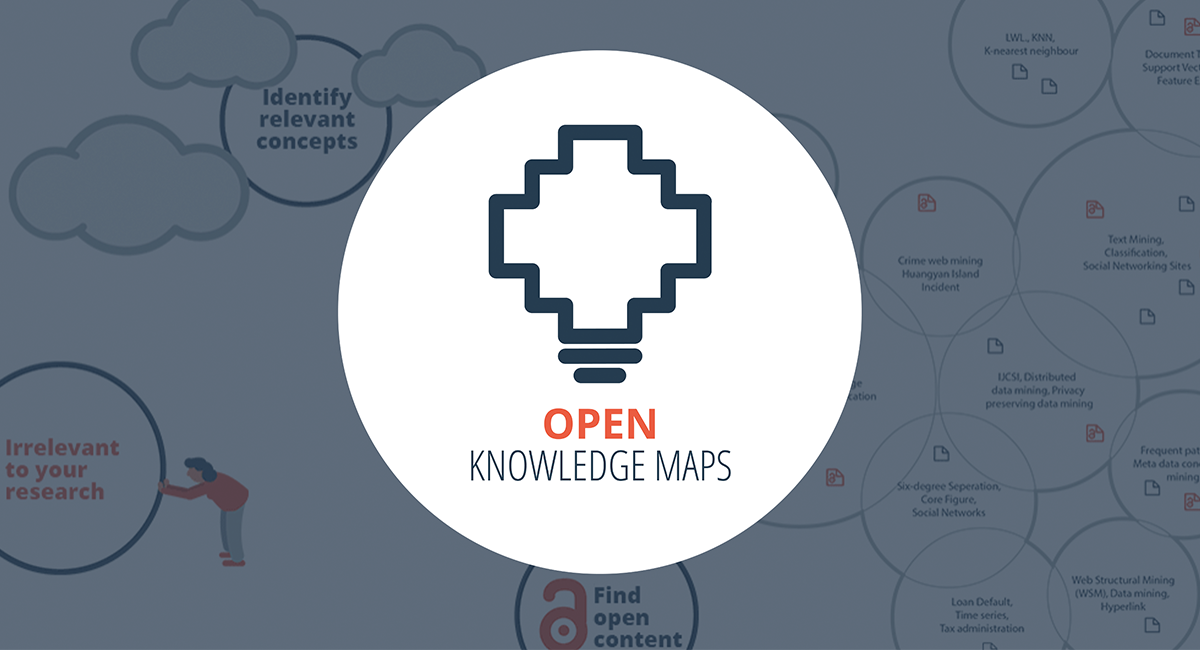5 min. read.
In today’s world, we face many challenges such as climate change, the spread of infectious diseases, and global inequality. If we want to effectively tackle these complex issues, we need to be able to discover relevant research and to build on each other’s knowledge. But this much-needed collaboration is currently at stake due to a crisis in discoverability. With three million publications per year, as well as many new output formats (e.g., datasets, preprints, and source code), discoverability of scientific knowledge has become a challenge in itself, and the on-going pandemic made this problem even more evident. Since the outbreak of the coronavirus, we have witnessed an explosion of scientific publications and data related to it, and researchers struggle to stay on top of this knowledge.
This is where Open Knowledge Maps comes into play. Instead of a long list of search results, our discovery system presents you with a clustered overview for your query, a so-called knowledge map. Below you can see an example map for the topic of “tecnología de la educación” (Educational Technology). The bubbles represent sub-topics, such as “educación en tecnología” (Technology Education) or “psicología de la educación” (Psychology of Education). Relevant papers are attached to each sub-topic, which can be accessed by clicking on the related bubble. The main advantage is that you gain an instant overview of a topic and its main areas, and you can also explore the papers and concepts related to each area by navigating through the map.

Knowledge Map for the topic of “tecnología de la educación”
Open Knowledge Maps highlights open access documents, making it easy to identify documents that you can read right away without any paywalls. They also help you identify relevant and related content by grouping similar papers together. This is especially useful when you are using an ambiguous term during your search, or when you want to identify content from a single discipline in a multidisciplinary field. It is also useful when you are new in a research field when much of the area’s specific jargon may be unfamiliar.
Open Knowledge Maps collaborates with BASE, one of the largest aggregators of scientific knowledge, indexing more than 300 million documents from close to 10,000 sources worldwide. This enables you to create knowledge maps in any discipline and in a wide variety of languages. The search results are not limited to scholarly articles, but can also be configured to include open access preprints, datasets, and other types of information. New features such as export and citation of documents are regularly added, making this tool an invaluable resource to support your research.

Advantages of Open Knowledge Maps
Knowledge maps are automatically created based on the metadata of the most relevant documents for your query. After an initial cleaning and de-duplication process, the text similarity between title, abstract, authors and keywords is computed. The clustering algorithm groups together those documents that have more words in common, the sub-topics are based on document keywords, and the most descriptive keywords are determined by selecting those that appear frequently within a cluster, but seldom in other clusters.
To date, almost a million knowledge maps have been generated using the service. The growing group of users includes researchers, students, librarians, educators, science journalists and practitioners across all scientific disciplines and geographic regions. Visit the website to create a knowledge map for a topic of your choice.
Open Knowledge Maps is a non-profit organization dedicated to dramatically increasing the visibility of scientific knowledge for science and society alike. We believe that a better way to explore and discover scientific knowledge will benefit us all. Our aim is to create an inclusive, sustainable and equitable infrastructure that can be used by anyone. This is why all of our tools are free and our content, data, and software are openly licensed. In addition, we have developed presentations and workshop concepts together with our community to introduce Open Knowledge Maps to new audiences. Are you interested? Check out our training materials, which are available in English, Spanish, and Portuguese.
Open Knowledge Maps is community-owned and community-driven, funded by a supporting membership program, which is always looking for new members to join and co-create the platform. Additionally, we have recently introduced the ability to integrate our knowledge maps in other discovery systems such as institutional repositories and library catalogues. In the future, we want to enable our users to collaboratively edit the knowledge maps on our platform, transforming a closed and individual process to an open and collaborative one. Our vision is to augment this process with our machine learning core, and to create a large-scale system of open, interactive, and interlinked knowledge maps of the world’s scientific knowledge.
Join our user community! Try out our tool and follow us on LinkedIn, Twitter, and Facebook.
By Michela Vignoli, Peter Kraker and Maxi Schramm of Open Knowledge Maps.


What role does the Inter-American Development Bank play in addressing environmental and sustainability challenges in the region?